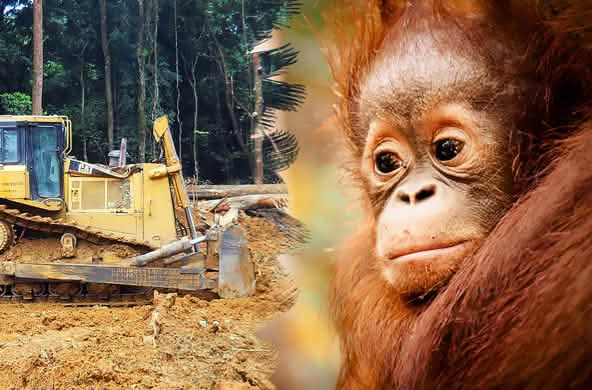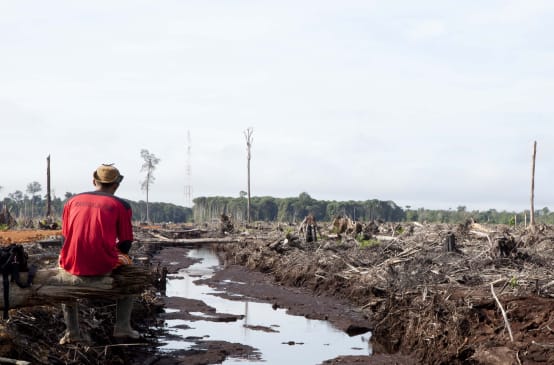The tragedy of Tanjung Puting National Park
: In Borneo’s Tanjung Puting National Park, ancient trees are being felled for oil palm plantations. Meanwhile, palm oil companies are patting themselves on the back for their “sustainable” farming practices at their annual meeting on Sumatra. And the EU is ignoring the devastating consequences of its agrofuels policy for the rainforests. A report from Indonesia.
November 11, 2013, Tanjung Puting National Park in southern Borneo: we are taking a boat up the long rivers with our guide. Komrudin is a friend of our partner Nordin of Save our Borneo and has invited us to accompany him in his work.
For years, Komrudin and the indigenous community have been committed to preserving the national park and the culture that permitted humans and orangutans to live side by side peacefully.
Komrudin told us that oil palm plantations are now being established in the middle of the national park. We don't want to believe it. We pass elegant buildings, a beautiful wooden gate, and signs with photos of photos of orangutans and the caption “Indonesia’s pride, Tanjung Puting National Park – habitat of wild orangutans.”
Half an hour further upstream, we encounter a huge ship with oil palm seedlings. Following the small boats that bring the seedlings on land, we are confronted with a scene of devastation.
Once dense rainforest – now barren earth and dry wells
Komrudin takes us to meet Bujok. He is an indigenous Dayak, and his hut once stood here. “We no longer even have water to drink,” he explains. The wells went dry when the plantations were established and the peatland drained. The forest – his source of food – is gone.
Despite the stifling heat, we continue to hike across the wasteland. We want to reach the edge of the forest, but we are soon stopped by burly men. Staring Komrudin down, they ask him why he brought us here. “We want these oil palm plantations. If you don’t leave at once, you can forget about meeting your family, you little troublemaker. We’re armed, so beat it.”
Turning to us, another man explains: “We’re the true owners of the land, and we want oil palm plantations. This Dayak is lying to you – this area was never forested. It was once our farmland.” The tree stumps tell a different story, however.
The situation escalates as more broad-shouldered men with non-local accents emerge from the wooden shacks. To protect Komrudin, we claim that we only wanted to see the forest and orangutans, and had clearly gotten lost. “Oh, you certainly have – this isn’t a national park. We’ll show you the way. Please get back into your boat immediately. This land belongs to the Bumitama Gunajaya Agro oil palm plantation.”
The forest is gone, and with it the community’s livelihood
The men we just encountered have dished out threats and beatings in the past and destroyed Komrudin’s efforts to integrate the forest dwellers and their knowledge into the national park. None of them would fell a tree without the agreement of the others, and meticulous records were kept about the preservation of the forest. They also ensured that no one captured the orangutans.
Many of the indigenous people had worked as guides, giving visitors insights into their lives and environment while protecting the forest. They have now lost their livelihoods along with the forests of their ancestral home. The national park was divided into zones, some of which were off limits to the indigenous population. We are now standing on land allocated to them – an utter wasteland.
Back at his office in Kumai, Komrudin shows us documents proving that the palm oil company does not have a permit. Komrudin and his friends have pressed charges against BGA on several occasions, for reasons including the killing of four orangutans found in the deforested area. The cases are stuck in the labyrinth of the Indonesian legal system, however, and meanwhile the company’s clear-cutting continues unhindered.
Thousands of forest dwellers demonstrate against the palm oil mafia
While we were travelling through Tanjung Puting National Park on the search for pristine forest, thousands of indigenous forced laborers made their way from the oil palm plantations to Medan in Sumatra. Like our partners Nordin and Feri Irawan, they were intent on speaking out against the palm oil mafia’s lies at the annual meeting of the Roundtable on Sustainable Palm Oil (RSPO) – the first time the meeting was held in a producing country.
On November 12, 2013, nearly 5,000 people demonstrated for the abolition of the RSPO – a lobby organization for companies such as Wilmar, BGA and IOI that greenwashes human rights abuses, exploitation and rainforest destruction.
Plantations expand further under the cover of the “sustainability seal”
“Over the past ten years, ‘sustainable’ palm oil has only led to the further expansion of plantations and destruction of forests,” explained Nordin of Save our Borneo, an environmental and human rights organization, during the protest.
The representatives of the palm oil industry and a number of NGOs watched anxiously from their conference room as the marching protesters appeared at the huge windows of the hotel but subsequently ignored the demonstration – no mention was made of it in any of the RSPO’s press releases. Their apparent tactic: keep a low profile during the conference and then jubilantly announce that all palm oil would be sustainable by 2015.
The next day, the RSPO spokesperson described the industry’s great progress in glowing tones. WWF, Unilever and a number of hired farmers announced with a great fanfare that sustainable palm oil would now be available from small farmers! While five of them were being showcased, the hundreds of indigenous farmer who had been evicted from their land by Wilmar were conveniently ignored.
“We need to think positive now,” explained the RSPO spokesperson. “We were even successful with regard to biofuels. Neste Oil of Finland is now the first company whose palm oil biodiesel is certified and thus meets the EU criteria. And we’re proud of that!”
Neste Oil, however, buys its palm oil from the IOI Group, the parent company of BGA, and Wilmar. The RSPO is like a theater that just keeps on staging the same tired old farce year after year. And yet, the EU recognizes its seal and uses it to drive mandatory blending quotas ever higher.
Meanwhile, in Tanjung Puting National Park, the BGA Group is revving up its chainsaws.

Borneo: axing a national park for palm oil
Despite a clear verdict by Indonesia's Supreme Court (see News and Updates), a palm oil company is still clearing land in Borneo's Tanjung Puting National Park and encroaching on the last remaining habitats of endangered orangutans and proboscis monkeys. Please take a stand and sign our petition to the Indonesian government.

Palm oil
Palm oil is literally everywhere – in our foods, cosmetics, cleaning products and fuels. How could it come to this?